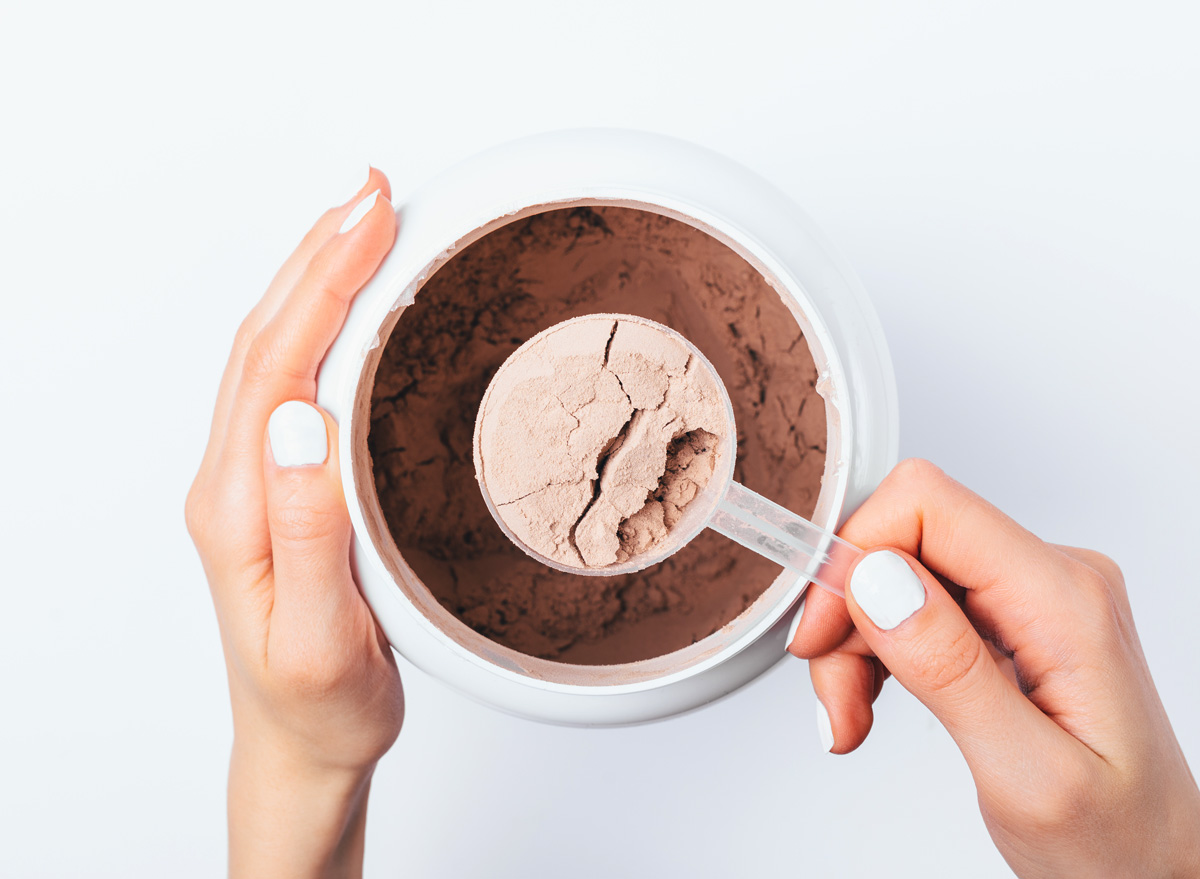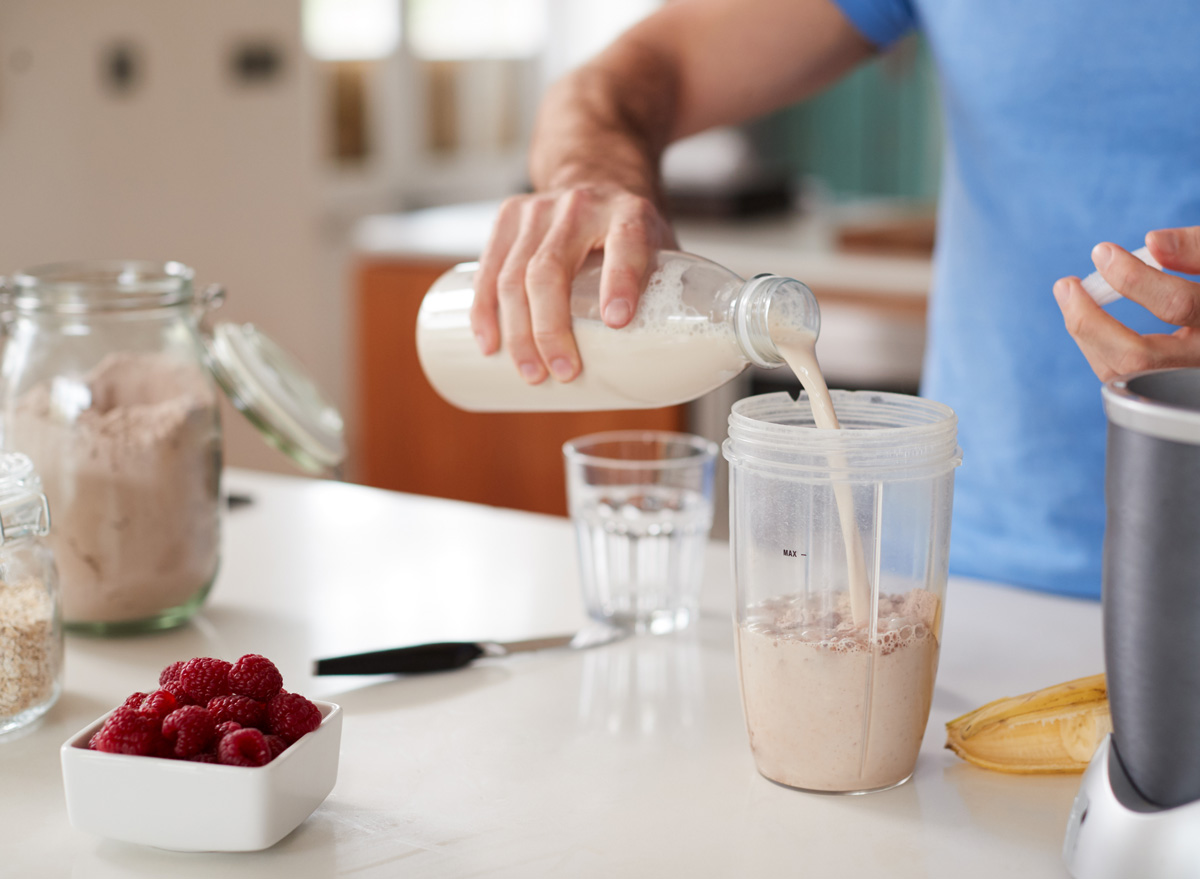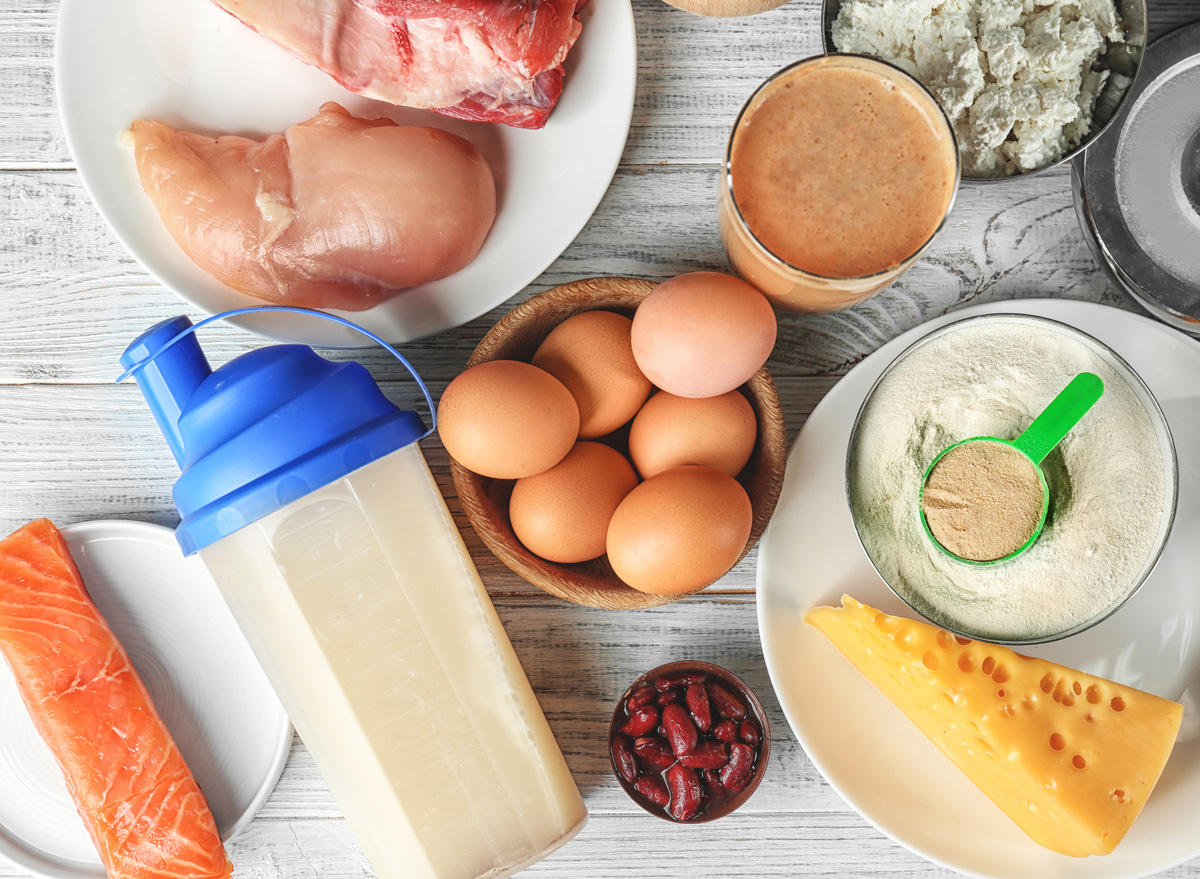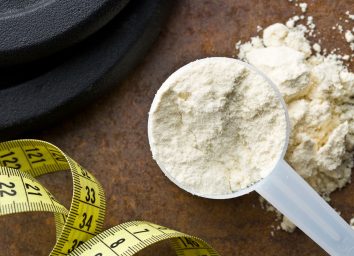11 Dangers of Eating Protein Powder Every Day, According to Dietitians

The global protein supplements market is anticipated to a market size of $32.6 billion by 2027, so to say that protein powder is popular is an understatement. With so many people including protein powder in their diets, we've been wondering: are there any dangers of consuming protein powder every day?
To answer our question, we consulted registered dietitians to give us more insights into how eating too much protein powder may negatively affect your health.
you share any dangers of eating protein powder every day? What negative side effects can this supplement have on consumers' health? What should consumers be concerned about or consider before using protein powder? Read on, and for more on how to lose weight, you won't want to miss What Happens To Your Body When You Drink Protein Shakes Every Day.
You may not know what you're consuming

"The biggest danger with consuming protein powders every day is the potential contamination of the supplements. The Food and Drug Administration (FDA) does not regulate all supplements. This means that what is inside the bottle may not be what is on the label," explains Emily Danckers, MS, RD, registered dietitian and founder of Emily RD Nutrition Coaching who has worked with professional and collegiate athletes.
"Supplements can be contaminated with ingredients not listed on the label unless the supplement is third-party certified. This means a company like NSF, Informed Choice, or USP has verified that the supplement is clean and only contains what is on the label. If a protein powder is third-party certified, there will be a label on the tub. It's important to note that this label only means that what is on the label is in the bottle in the printed amounts…it does not mean that the supplement will be effective," she adds.
You may gain weight

"Some protein powders may be high in sugars and calories, which can cause unwanted weight gain," says Melissa Nieves, RD a registered dietitian at Kemtai, a virtual personal trainer app. Sugar isn't the only contributor to extra calories in this supplement—protein is just as much of a factor. "Excess protein intake can lead to weight gain as the surplus protein in the body is stored as fat as it has nowhere else to go," adds Lina Velikova, MD, PhD, a Clinical Immunologist, Gastroenterologist, and medical advisor at Supplements101.
Related: 5 Ways Protein Powder Can Cause Weight Gain
You may be displacing other important nutrients

"For most healthy individuals, the 20-30 grams of protein in a shake is not really a huge concern to consume every day. However, it becomes a concern when a number of daily protein shakes start to displace other important nutrients in the diet like healthy fats and fiber-rich, healthy carbs," says registered dietitian Abbey Sharp, RD, blogger and YouTuber at Abbey's Kitchen.
Garrett Swisher, RD, an Indiana University Health Clinical Dietician shares the same concern: "More protein does not really offer any kind of extra benefits. Focusing on too much protein can offset the intake of other important foods and the nutrients they contain like fruit and vegetables," he says. "It's generally never a good idea to focus on one food/nutrient if you are neglecting other elements of a healthy diet.
You may be forgetting about whole food sources of protein

"Protein powder is a good supplement; however, it should not replace whole food protein sources like meats, poultry legumes, and nuts/seeds," says registered dietitian Alana Kessler, MS, RDN the founder of Be Well by Alana Kessler.
You may be consuming toxins

"There are some instances of powders containing heavy metals which over time can have a titration effect leading to health problems. BPA and pesticides have also been uncovered in some powders," Kessler tells us. "Consider the manufacturer and look for chemical-free powders," she adds.
"A nonprofit group called the Clean Label Project released a report about toxins in protein powders. The researchers evaluated 134 products for 130 types of toxins and found that many protein powders contained heavy metals such as lead, arsenic, cadmium, and mercury, bisphenol-A (BPA), pesticides, or other contaminants with links to cancer and other health conditions," says Nieves. According to the report, "some toxins were present in significant quantities. For example, one protein powder contained 25 times the allowed limit of BPA."
You could be exacerbating a food intolerance

"Many protein powders have milk protein in them. For individuals that have a lactose sensitivity, this can cause discomfort and digestive distress leading to malabsorption of essential minerals," says Kessler.
Related: 25 Unhealthiest Habits for Your Digestion
You may not be getting as much protein as you think you are

The grams of protein on the label may not match what's in the tub, says Swisher. "Protein powders are usually generally safe; however, they are not tightly regulated. Some dubious manufacturers have been known to 'protein spike' their products, a way of cheating the test to determine protein content. This means that your protein powder may not have as much protein as what is advertised," he explains.
That may not sound too concerning, but it could be dangerous for some people. That's because there are some people who may not get enough protein throughout the day and may benefit from getting a protein boost, according to registered dietitian Amanda A. Kostro Miller, RD, LDN, who serves on the advisory board for Fitter Living. "Such populations include: elderly, those with poor food intake (i.e. due to illness), those in hypermetabolic states (i.e. those who are undergoing cancer treatment), malnourished, and very active teens." If people with these conditions are relying on protein powder as one of their protein sources, then they might not be meeting the nutritional requirements they need for a healthy diet.
You may burden your kidneys

"Some individuals can consume too much protein. Those with kidney problems generally need to be cautious of consuming too much protein as the kidneys can struggle with processing high amounts," says Swisher.
"Getting too much protein can also lead to dehydration since the kidneys work to flush out excess protein," adds Kostro Miller.
You may negatively affect your bone health

"Too much protein can increase the risk of kidney stones, and can decrease calcium retention and thus increase the risk of bone fractures," says Nieves.
You may get a sugar high

"Lots of protein powders have tons of flavorings, sugar, and additives to make them taste better. When possible, try to find a protein powder that is minimally flavored; otherwise, all that sugar can add up to something similar to a soda!" says Kostro Miller. This is particularly concerning for those who buy protein powders as supplements in protein smoothies, as they will already have a good amount of carbs and natural sugar from fruit.
"Overall, I'd say it's best to avoid protein powder if you can opt for another way to spike your smoothie with protein. You can try adding more yogurt, seeds and nuts for this purpose. Even tofu can help add more protein to a smoothie without compromising the taste, which is one of my favorite tricks for making creamier smoothies," recommends Velikova.
You may run the risk of consuming an allergen

Lactose isn't the only nutrient to look out for when picking a protein powder. "If you have certain food allergies/intolerances (i.e. milk, lactose, soy, egg) check the label on your protein powder. If you have an egg or milk sensitivity/allergy, look for plant-based protein sources like pea, hemp, or brown rice protein," says Kostro Miller. For examples see these The Best Vegan Protein Powders for Your Muscle-Building Needs.








